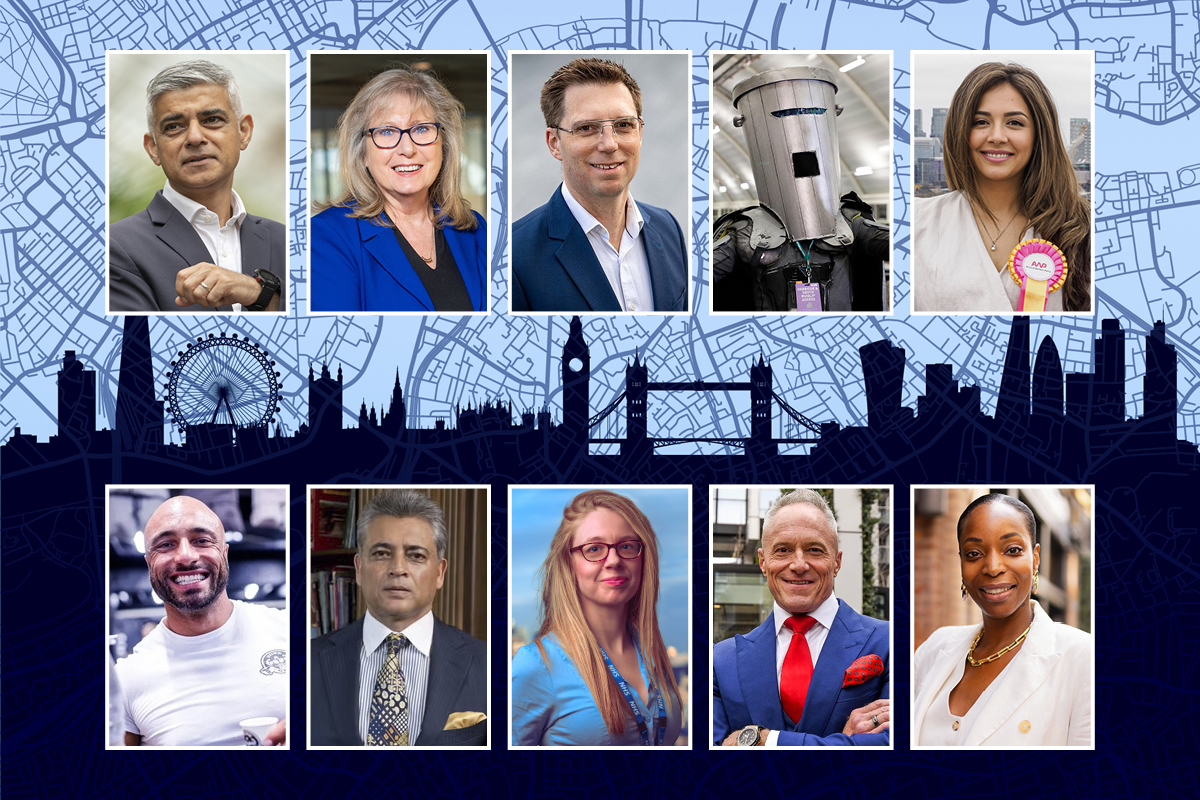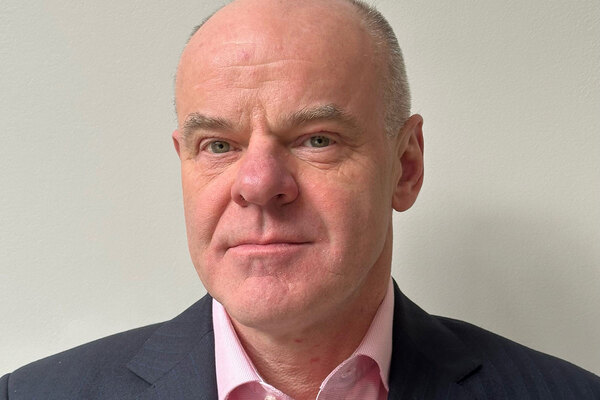You are viewing 1 of your 1 free articles
A fair copper
Sir Peter Fahy, ex-chief constable of Greater Manchester Police, is the highest-profile former policeman to take up a role in the housing sector. Gavriel Hollander finds out more about Plus Dane’s new chair
Video:
feature code

Source: Lorne Campbell / Guzelian
“He doesn’t look like a copper,” Plus Dane’s chief executive Barbara Spicer says of her new chair, Sir Peter Fahy, over a drink with Inside Housing after a long day at the National Housing Federation (NHF) conference in Birmingham last month. She means it as a compliment.
Meeting Sir Peter a few hours earlier in between sessions at the NHF’s annual get-together, it is sometimes difficult to imagine that, as chief constable of Greater Manchester Police (GMP), he had been responsible for the UK’s third-largest force as recently as 12 months previously.
Social purpose
Looking relaxed and engaged ahead of our interview, wearing a tieless, well-cut suit as he signs letters to be sent to tenants, Sir Peter’s demeanour does not match the buttoned-up, uniformed stereotype of the career policeman. And that’s something with which the 57-year-old seems entirely comfortable.
“I was accused by Graham Stringer MP of being more like a social worker than a police officer,” he recalls, referencing a long-running and very public feud with the Labour MP that punctuated his time at the helm of the GMP. “I plead guilty to that.”
The row was sparked by what the MP saw as a soft response to the 2011 riots in Manchester, but Sir Peter readily admits that his focus as a chief constable was on community policing as much as crime prevention. To him, that means engaging with people instead of responding to emergencies.
“Some politicians just want the police to do law enforcement; that does not solve the problem or create public satisfaction.”
“It’s about whether you’re being reactive or problem-solving,” he explains. “Some politicians just want the police to do law enforcement. That does not solve the problem or create public satisfaction.”
Leaning across a low coffee table, arms on knees as he speaks, Sir Peter is clearly passionate about the role of public bodies in improving the lives of communities. It’s also easy to see why Plus Dane approached him to become the highest-profile former policeman to take a job in the housing sector.
Video:
Ad slot
Sir Peter retired from GMP last October after a 34-year policing career. Having moved into the housing sector, does he see parallels with his former line of work? “Good local housing officers and good local beat officers and PCSOs [police community support officers] get on incredibly well because they actually understand what’s going on,” he answers.
During his seven years at the head of GMP, Sir Peter says he saw first-hand the difference good housing providers can make to a community. “I worked with some really dynamic housing associations in Greater Manchester that tenants were really proud of. I think housing associations should be a voice for people in those sorts of areas.”
Unsurprisingly, the ones he picks out are those who understood that being a landlord was just one part of the job. “[It was] those who were prepared to see their role as much wider than just providing or managing houses, who saw a real need to empower and enrich local community life, get people involved and tackle issues like long-term unemployment.”
Local solutions
Plus Dane’s eye-catching appointment of Sir Peter - who worked closely with Ms Spicer when she was chief executive of Salford Council - is one of a number of recent changes to its board, made following a tumultuous period which included a governance rating downgrade from the regulator and the departure of former chief executive Ken Perry. Other 2016 appointees - including public health expert Ann Hoskins, former banker Rob O’Malley, and digital entrepreneur Jon Corner - show that the 18,000-home landlord is looking to draw on experience from beyond the housing sector.
Sir Peter acknowledges that the organisation he now chairs “has come through a difficult time” but says the challenge now is “how it grows and holds on to its social purpose”. The new make-up of the board speaks loudly to his principle that no public service can produce positive results in isolation.
“The drive to build more houses has to sit alongside a drive to strengthen community life.”
“For me that only comes about when people are working together in the same office. Partnership is fine, but partnership is about a load of people sitting in different offices, coming together every now and again for meetings. You have to fundamentally join it up day-to-day if you really want to tackle these long-lasting issues.”
And when it comes to housing, building isn’t enough. Gesturing around him at Birmingham’s International Convention Centre, Sir Peter continues: “You can have economic development and wonderful places like this but the big question is: is that feeding down into other neighbourhoods and estates, for people with poor life chances? How do you make sure a big shiny place like Media City is relevant to people on an estate in Salford?”
But what of the pressure housing associations are now under to deliver ever greater numbers of homes? “The drive to build more houses has to sit alongside a drive to strengthen community life,” he insists. “You have to take pressure off health and other caring agencies; just pumping more money into the NHS won’t solve things, you have to come up with innovative local solutions.
“There are so many examples where people have built new houses and physically regenerated an area but haven’t regenerated the people. And the people have gone back to live there and the situation has been the same, because you’ve not addressed the long-term underlying social issues, the lack of aspiration, the underachievement of white working-class lads. If you don’t address that, then just building a new house isn’t going to solve [the long-term issues].”
Those solutions, according to Sir Peter, need to involve more genuine partnerships, not only between various public agencies, but also with the people they are serving. It is a vision that has echoes of David Cameron’s Big Society project. “It breaks into this idea that the public out there are customers,” he says. “That was a big problem for policing because certain politicians told the public: ‘you’ve got rights and you’re a customer of the police’. Well, no you’re not; you’re a citizen [and] part of your duty is to be involved in local community life. You can’t use the scouts as a cheap form of babysitting for your kids. Why are you not deciding to volunteer to help the scout group?”
Wake-up call
The word ‘customer’ seems to have replaced ‘tenant’ in modern housing association lexicon, so is Sir Peter worried about going off message? Apparently not. “It’s driven by a customer service culture and customer service language,” he continues. “I’m much more interested in how you get more tenant involvement.”

Source: Lorne Campbell / Guzelian
The former policeman knows his profile in public life means he has the ear of Whitehall’s power brokers more than most of his peers. “As a chief constable you have connections,” he admits. But he has doubts about politicians. “My own feeling is that some politicians don’t understand complex dependency and disadvantage. Often that is made harder by the single ministries in London, which is not the nature of life out on the ground.”
“Brexit did show a dislocation in certain communities.”
He says the EU referendum result should act as a wake-up call to the political classes: “Brexit did show a dislocation in certain communities. [They] do feel completely dislocated from local political life, from the language of Westminster, from the mainstream media. There’s a huge issue around how we bridge that gap, because from what I see that gap is getting greater.”
Sir Peter’s “day job”, as he describes it, is as chief executive of Retrak, a charity that works with street children in Brazil and East Africa (see box). He sees similarities between the problems facing these children and young people in the UK.
“It’s the same issue in Africa: do people have hope? If people don’t have hope in the system then they are going to think about running away to the city and migrating to Europe. Similarly, if you’re a young person growing up on an estate and you don’t have hope in the system, you’ll think the world of the drug dealer is pretty attractive.”
Sir Peter will spend up to four days a month with Plus Dane, while also travelling with Retrak, but thinks the two roles “will feed off each other”. At a time when many of his peers would be eyeing a more comfortable retirement, is he not worried about the workload? “When you’re a chief constable you get used to juggling lots of things,” he says, adding with a smile: “I’m not a great one for work-life balance.”
Parallels with policing Sir Peter’s ‘day job’ at Retrak
Retrak, in Sir Peter Fahy’s words, “operates in some of the poorest countries in the world, with some of the most vulnerable members of those societies”.
Working with children living on the street in East Africa and Brazil, the organisation tries to tackle the problem at its source through a combination of intervention and prevention, working with children, families and governments. In 2015 it supported more than 24,000 children and their families.
Sir Peter, who took over as chief executive in July 2015, says his new job has parallels with his previous one at Greater Manchester Police: “At their heart, policing and Retrak are about protecting vulnerable people. In both jobs you see the best and worst of humanity.”







